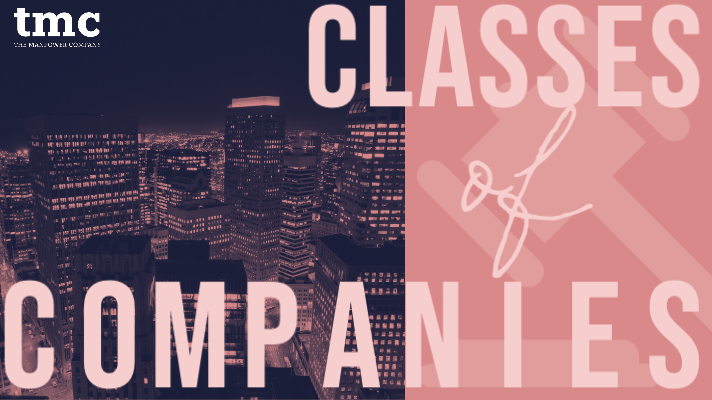The company is the most effective vehicle yet in managing and controlling modern business enterprise. Other forms of organisation also maintain this goal, but most business is transacted via companies. In fact, the company pervades economic and social life all over the world, because of the advantages it enjoys over other forms of organisation. Companies can be classified based on their mode of incorporation, the liability of its members as well as the number of members. In this article we’ll look at the main classes of companies and their advantages.
CLASSES OF COMPANIES: COMPANIES LIMITED BY SHARES (LLC)
In this class of company limited by shares, the company has full should it go into debt. ‘Limited by shares’ means that the liability of shareholders to creditors of the company is limited to the capital they originally invested. The shareholder’s liability is only the amount unpaid of their shares. Companies limited by shares end with the word ‘Limited’ e.g. East Africa Breweries Limited (EABL), Kenya Airways Limited etc.
Companies limited by shares may be Private or Public.
Private Companies
Private companies have no authorised minimum share capital and member’s rights to transfer shares are restricted. Private companies prohibit invitations to the public to subscribe for shares in the company. A private company is only required to have one director and it can be formed with only one member.
Public Companies
Public companies allow their members the right to transfer their shares in the company and allow invitations to the public to subscribe for shares in the company. A public company must have at least two shareholders and at least two directors.
The advantages of a company limited by shares are that they allow for multiple owners of the company (shareholders). Additionally, in the event of liquidation, the financial liability for the shareholder is limited to the value of their shareholding.
CLASSES OF COMPANIES: COMPANIES LIMITED BY GUARANTEE
In a company limited by guarantee, the liability of its members is based on the amount the members undertook/promised to pay to the company in the event that the company is unable to pay its debts or goes into liquidation. This company does not have any shares or shareholders but is owned by guarantors who agree to pay a set amount of money towards company debts.
Companies limited by guarantee are most commonly used as the structure for social enterprise organisations such as clubs, Non- Governmental Organisations (NGOs), charities, cooperatives and residential property management companies.
The main advantage of this company structure is that it is a separate legal entity from its owners and they are protected by limited liability. This means that the company can sue or be sued in its own name and that the company is responsible for its own debts and not its members.
CLASSES OF COMPANIES: UNLIMITED COMPANIES
In unlimited companies, there is no limit to the liability of its members. This means that the members have unlimited obligation to meet any insufficiency in the assets of the company in the event of the company’s liquidation. This form of company is mainly formed for the purpose of holding stocks, land or property with no likelihood of incurring trading debts.
An advantage of this form of company is that the unlimited nature of its liability allows for careful risk management. This is because the owners can suffer substantial loses if things take a wrong turn.
Deciding on the form your company should take can sometimes be challenging. However, this doesn’t have to be the case. If you’ looking to start a company, consider your company’s business form, purpose and the potential liability of its members. Hopefully this article will provide you with some clarity so that you can make an informed decision for your company.
Also see:
Mshimba Michelle






